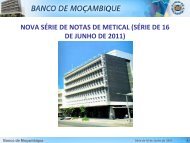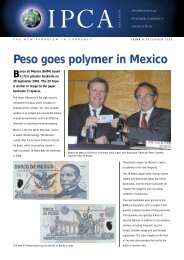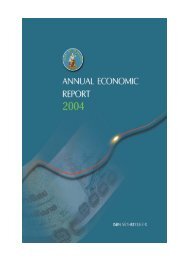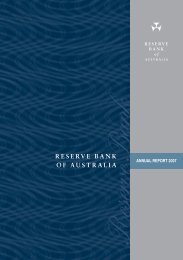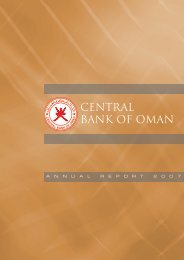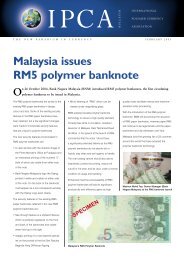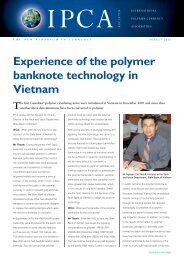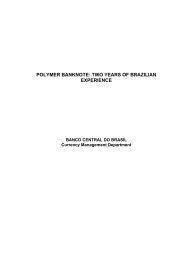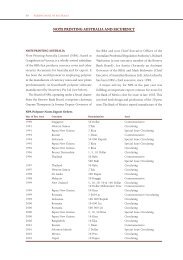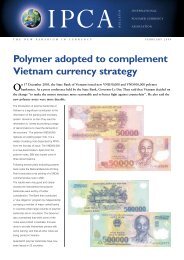Reserve Bank of Australia Annual Report 2011
Reserve Bank of Australia Annual Report 2011
Reserve Bank of Australia Annual Report 2011
Create successful ePaper yourself
Turn your PDF publications into a flip-book with our unique Google optimized e-Paper software.
countries), the main international financial institutions (including the IMF, the <strong>Bank</strong> for International Settlements<br />
(BIS) and the World <strong>Bank</strong>) and the standard-setting bodies, such as the Basel Committee on <strong>Bank</strong>ing Supervision<br />
(BCBS) and the Committee on Payment and Settlement Systems (CPSS).<br />
The <strong>Reserve</strong> <strong>Bank</strong> and the <strong>Australia</strong>n Treasury jointly represent <strong>Australia</strong> on the FSB. The Governor is a member<br />
<strong>of</strong> the FSB Plenary (the ultimate decision-making body) and two <strong>of</strong> the FSB’s committees. The Head <strong>of</strong> Financial<br />
Stability Department is a member <strong>of</strong> a group that provides analytical support on assessing global financial<br />
vulnerabilities.<br />
A major area <strong>of</strong> the FSB’s recent work relates to systemically important financial institutions (SIFIs). In late 2010,<br />
the FSB presented a report and policy options to G-20 leaders on reducing the moral hazard posed by SIFIs.<br />
A key feature <strong>of</strong> this report was to distinguish between those institutions that are systemically important in a<br />
global context – termed global SIFIs (G-SIFIs) – and those that are important only in a domestic context. Given<br />
the greater risk they pose to the global financial system, the G-20 agreed that, along with other measures,<br />
G-SIFIs should have higher capital than the new Basel III minimum. Senior <strong>Bank</strong> staff are also involved in a<br />
macroeconomic assessment <strong>of</strong> the impact <strong>of</strong> the FSB’s G-SIFI recommendations, especially the likely capital<br />
surcharge; this task is being undertaken by the FSB in co-operation with the BCBS, the BIS and the IMF.<br />
Other main areas <strong>of</strong> the FSB’s work over the past year include 1 :<br />
••<br />
Improving resolution frameworks, including through the development <strong>of</strong> key attributes <strong>of</strong> effective<br />
resolution regimes that identify the essential features that countries should have in their resolution regimes<br />
for financial institutions. A package was released for public consultation in July. Related to this, national<br />
authorities are being asked to improve the ‘intensity and effectiveness <strong>of</strong> SIFI supervision’ – with such<br />
efforts guided by an FSB report in this area. National authorities are also assessing how existing frameworks<br />
for banking and insurance supervision compare with relevant standards.<br />
••<br />
Strengthening the regulation and oversight <strong>of</strong> the ‘shadow banking system’, that is, those non-bank<br />
financial institutions that engage in bank-like activities and hence are in the credit intermediation chain<br />
but do not face the same prudential regulation as banks. The Head <strong>of</strong> Financial Stability Department has<br />
been on an FSB task force developing initial recommendations for discussion, while senior staff from that<br />
department have also participated in a group providing information and data to the task force.<br />
••<br />
Working jointly with the IMF and the BIS on macroprudential frameworks and tools. A report was released<br />
on this issue in February, with a progress report expected later in the year outlining advances in the state<br />
<strong>of</strong> knowledge and covering national and international developments.<br />
••<br />
Examining options for reform <strong>of</strong> over-the-counter (OTC) derivatives markets and market infrastructure, to<br />
reduce the scope for contagion (discussed further below).<br />
••<br />
Establishing regional consultative groups to broaden the circle <strong>of</strong> countries engaged in work to promote<br />
international financial stability. Six regional groups comprising FSB members and non-members have been<br />
established, with <strong>Australia</strong> included in the grouping for Asia. The first meetings <strong>of</strong> the groups will take place<br />
later in <strong>2011</strong>. The <strong>Bank</strong>, along with the <strong>Australia</strong>n Treasury, will participate in these meetings as required.<br />
The FSB undertook a country peer review <strong>of</strong> <strong>Australia</strong> in <strong>2011</strong>. The review is part <strong>of</strong> an FSB program that<br />
examines all <strong>of</strong> its members’ financial sectors, especially reviewing progress in implementing the IMF Financial<br />
Sector Assessment Program recommendations. The <strong>Reserve</strong> <strong>Bank</strong> contributed material to help inform the<br />
review, along with other agencies <strong>of</strong> the Council <strong>of</strong> Financial Regulators. The results <strong>of</strong> the review will be<br />
published later in <strong>2011</strong>. The FSB also recently published thematic reviews on risk-disclosure practices <strong>of</strong><br />
financial institutions and mortgage underwriting and origination practices. The Head <strong>of</strong> Financial Stability<br />
1 For details on these measures, see RBA, Financial Stability Review, March <strong>2011</strong>.<br />
36 <strong>Reserve</strong> bank <strong>of</strong> <strong>Australia</strong>



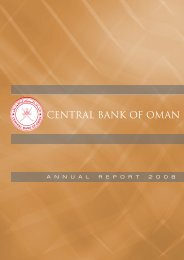
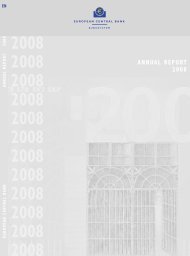
![KNOW YOUR NEW GIBRALTAR BANKNOTES - [Home] bThe/b](https://img.yumpu.com/50890985/1/184x260/know-your-new-gibraltar-banknotes-home-bthe-b.jpg?quality=85)
![PAPUA NEW GUINEA - [Home] - Polymer Bank Notes of the World](https://img.yumpu.com/49758743/1/190x143/papua-new-guinea-home-polymer-bank-notes-of-the-world.jpg?quality=85)

